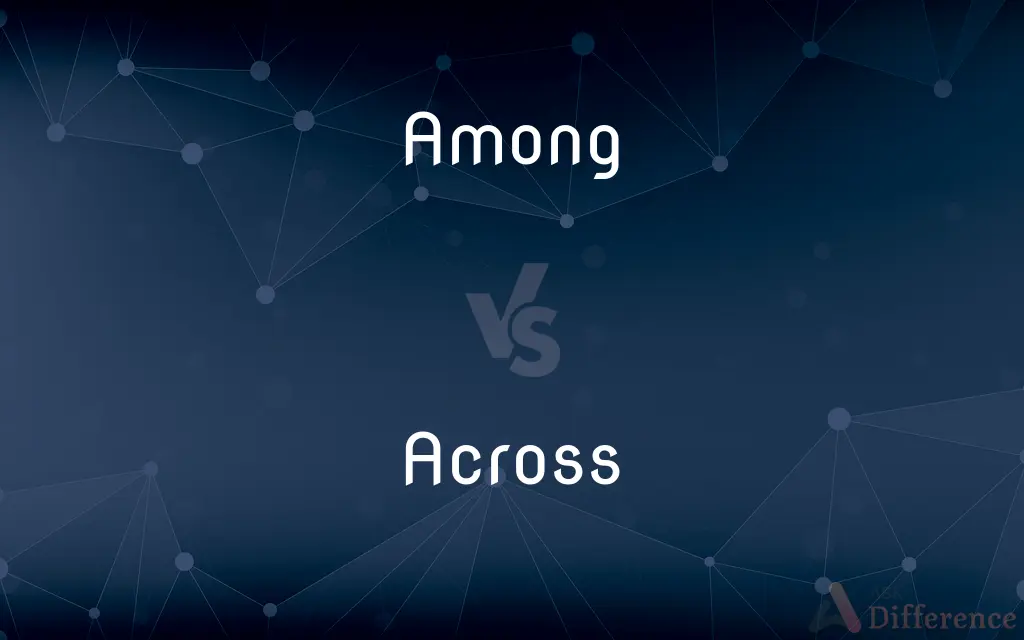Among vs. Across — What's the Difference?
By Tayyaba Rehman — Updated on October 25, 2023
"Among" denotes being surrounded by or part of a group, while "Across" indicates movement from one side to another or spanning over. Both are prepositions with distinct usages in English.

Difference Between Among and Across
Table of Contents
ADVERTISEMENT
Key Differences
"Among" is commonly used to indicate being in the midst of a group or collective, often when referencing more than two entities or situations. It suggests an inclusive nature. "Across," on the other hand, generally refers to movement from one side to another, such as crossing a physical space, or an expansive coverage. The directionality and expansiveness of "Across" is evident when contrasted with the inclusivity of "Among."
For example, if someone says a rumor is circulating "among" friends, it implies that the rumor is within that specific group. In contrast, if a rumor has spread "across" the school, it means it has moved through various parts of the school, reaching different groups and areas. Here, "Among" emphasizes the specific group, while "Across" highlights the broad spread.
Furthermore, "Among" can also denote a distribution or division happening within a group. Saying that candy was shared "among" the children means that the candy was divided within that group. "Across" wouldn’t typically be used in this context. Instead, "Across" could describe a physical journey, like traveling "across" the country, implying a movement from one end or side to another.
In essence, "Among" and "Across" serve as bridges in sentences, connecting ideas and actions. "Among" often relates to inner group interactions or distributions, bringing a sense of unity or sharing. "Across" provides a broader scope, indicating expansiveness or direction from one point to another, suggesting breadth or traversal.
Comparison Chart
Definition
Being within a group or collective.
Movement from one side to another.
ADVERTISEMENT
Usage
Typically used with more than two entities.
Can be used in reference to two points.
Indicates
Inclusivity or distribution within a group.
Directionality or expansiveness.
Example
Rumors among friends.
Spread across the school.
Grammar Role
Preposition denoting inner group relation.
Preposition indicating span or traversal.
Compare with Definitions
Among
Being in the midst of a group or collective.
He felt comfortable among his peers.
Across
On the opposite side or direction.
The grocery store is across the street.
Among
Shared or distributed within a group.
The prize money was divided among the winners.
Across
Spanning or covering a wide area.
The news spread across the town rapidly.
Among
Indicating a relation of a part to a whole.
She was among the few who understood the reference.
Across
On, at, or from the other side of
Across the street.
Among
Surrounded by or intermingled with.
The apples are hidden among the leaves.
Across
So as to cross; through
Drew lines across the paper.
Among
Situated more or less centrally in relation to (several other things)
You're among friends
Flowers hidden among the roots of the trees
Across
From one side of to the other
A bridge across a river.
Among
Being a member or members of (a larger set)
Snakes are among the animals most feared by man
A British woman was among the 54 victims of the disaster
Across
Into contact with
Came across my old roommate.
Among
Occurring in or shared by (some members of a group or community)
Members of the government bickered among themselves
A drop in tooth decay among children
Across
From one side to the other
The footbridge swayed when I ran across.
Among
Indicating a division, choice, or differentiation involving three or more participants
The State Council would elect a temporary president from among its members
The old king called the three princesses to divide his kingdom among them
Across
On or to the opposite side
We came across by ferry.
Among
In the midst of; surrounded by
A pine tree among cedars.
Across
Crosswise; crossed.
Among
In the group, number, or class of
She is among the wealthy.
Across
In such a manner as to be comprehensible, acceptable, or successful
Put our idea across.
Get a message across.
Among
In the company of; in association with
Traveling among a group of tourists.
Across
Being in a crossed position
Seated with arms across.
Among
By many or the entire number of; with many
A custom popular among the Greeks.
Across
To, toward, or from the far side of (something that lies between two points of interest).
We rowed across the river.
Fortunately, there was a bridge across the river.
He came across the street to meet me.
Among
By the joint action of
Among us, we will finish the job.
Across
On the opposite side of (something that lies between two points of interest).
That store is across the street.
Among
With portions to each of
Distribute this among you.
Across
Across from: on the opposite side, relative to something that lies between, from (a point of interest).
Among
With or against one another
Don't fight among yourselves. See Usage Note at between.
Across
From one side to the other within (a space being traversed).
The meteor streaked across the sky.
He walked across the room.
Could you slide that across the table to me, please?
Among
Denotes a mingling or intermixing with distinct or separable objects. (See Usage Note at amidst.)
How can you speak with authority about their customs when you have never lived among them?
Across
At or near the far end of (a space).
Among
Denotes a belonging of a person or a thing to a group.
He is among the few who completely understand the subject.
Across
Spanning.
This poetry speaks across the centuries.
Among
Denotes a sharing of a common feature in a group.
Lactose intolerance is common among people of Asian heritage.
Across
Throughout.
All across the country, voters were communicating their representatives.
Among
Mixed or mingled; surrounded by.
They heard,And from his presence hid themselves amongThe thickest trees.
Across
So as to intersect or pass through or over at an angle.
Lay the top stick across the bottom one.
She had straps fastened across the conduit every six feet.
Among
Conjoined, or associated with, or making part of the number of; in the number or class of.
Blessed art thou among women.
Across
In possession of full, up-to-date information about; abreast of.
Among
Expressing a relation of dispersion, distribution, etc.; also, a relation of reciprocal action.
What news among the merchants?
Human sacrifices were practiced among them.
Divide that gold amongst you.
Whether they quarreled among themselves, or with their neighbors.
Across
From one side to the other.
She helped the blind man across;
The river is half a mile across
Among
Involving several entities.
A consensus was reached among the committee members.
Across
On the other side.
If we sail off at noon, when will we be across?
Across
In a particular direction.
He leaned across for a book.
Across
(crosswords) Horizontally.
I got stuck on 4 across.
Across
A word that runs horizontally in the completed puzzle grid or its associated clue.
I solved all of the acrosses, but then got stuck on 3 down.
Across
From side to side; athwart; crosswise, or in a direction opposed to the length; quite over; as, a bridge laid across a river.
Across
From side to side; crosswise; as, with arms folded across.
Across
Obliquely; athwart; amiss; awry.
The squint-eyed Pharisees look across at all the actions of Christ.
Across
Placed crosswise;
Spoken with a straight face but crossed fingers
Crossed forks
Seated with arms across
Across
To the opposite side;
The football field was 300 feet across
Across
In such a manner as to be understood and accepted;
She cannot get her ideas across
Across
Transversely;
The marble slabs were cut across
Across
From one side to the other of a space.
She walked across the bridge.
Across
Extending or lying crosswise.
A log lay across the path, blocking our way.
Across
Encountering or confronting directly.
She came across an old diary while cleaning.
Common Curiosities
How does "Among" relate to sharing?
"Among" can indicate distribution or sharing within a group.
How is "Across" commonly used?
"Across" indicates movement from one side to another or spanning a broad area.
Is "Across" only used for physical movement?
No, "Across" can also denote spread of information or occurrence over a wide area.
Can "Among" be used for just two entities?
Generally, "Among" is used for more than two entities, while "Between" is for two.
How does "Across" show expansiveness?
When something spreads "across the country," it spans a vast area.
Is "Among" a preposition?
Yes, "Among" is a preposition.
How does "Across" differ from "Through"?
While both can indicate movement, "Across" often implies from one side to another, while "Through" suggests movement within or in the midst of something.
What does "Among" typically indicate?
"Among" usually denotes being within or surrounded by a group or collective.
What's an example of "Among" indicating relation?
"She was among the best in her class."
Can "Across" denote position?
Yes, like saying a building is located "across the street."
Does "Across" always indicate a complete traversal?
Not always. It can also indicate position or confrontation, like "coming across a problem."
Can "Among" be used to mean "in the group of"?
Yes, like in "He is among the selected candidates."
Why are "Among" and "Across" important in English?
Both serve as vital prepositions that connect ideas, actions, and entities in sentences, adding depth and relation to the narrative.
How does "Among" relate to unity?
"Among" often suggests a sense of togetherness or unity in a group.
What grammatical role does "Across" play?
"Across" serves as a preposition in sentences.
Share Your Discovery

Previous Comparison
Chapel vs. Chappel
Next Comparison
Homofermentative vs. HeterofermentativeAuthor Spotlight
Written by
Tayyaba RehmanTayyaba Rehman is a distinguished writer, currently serving as a primary contributor to askdifference.com. As a researcher in semantics and etymology, Tayyaba's passion for the complexity of languages and their distinctions has found a perfect home on the platform. Tayyaba delves into the intricacies of language, distinguishing between commonly confused words and phrases, thereby providing clarity for readers worldwide.
















































